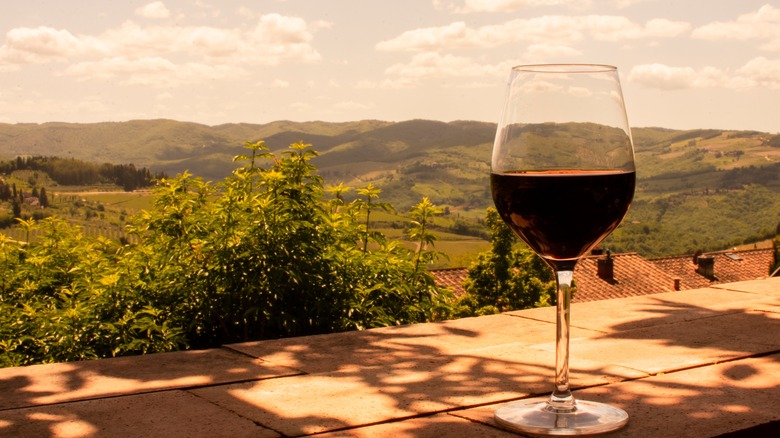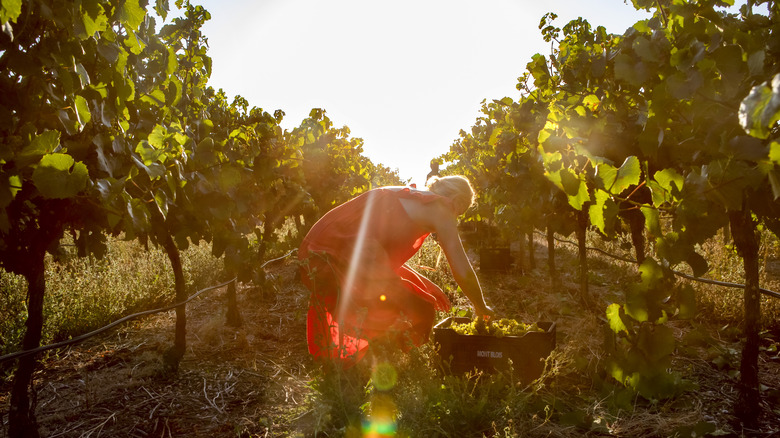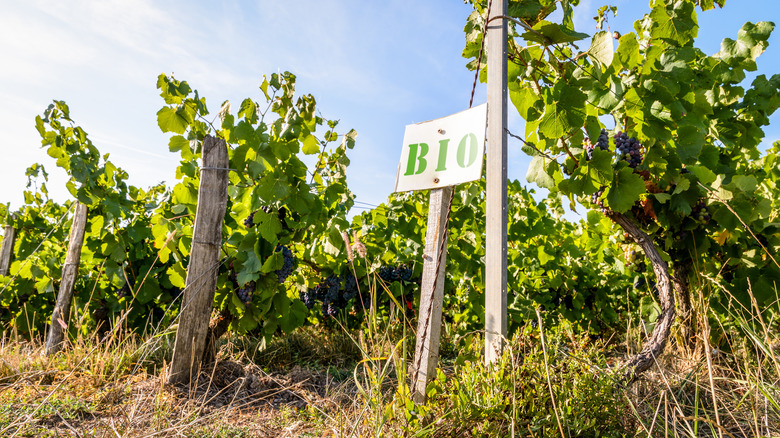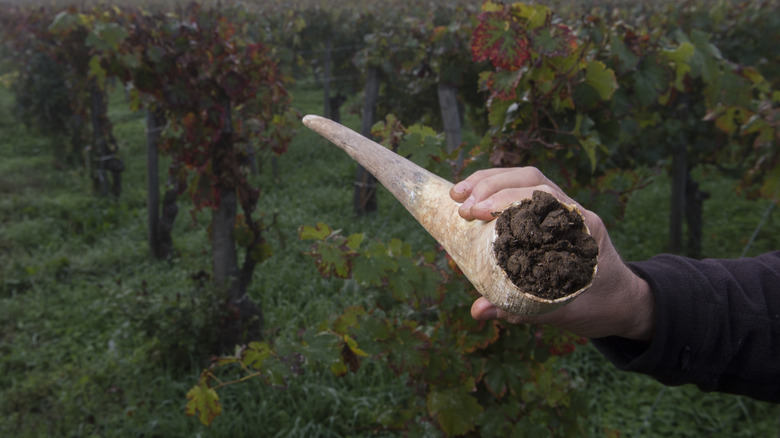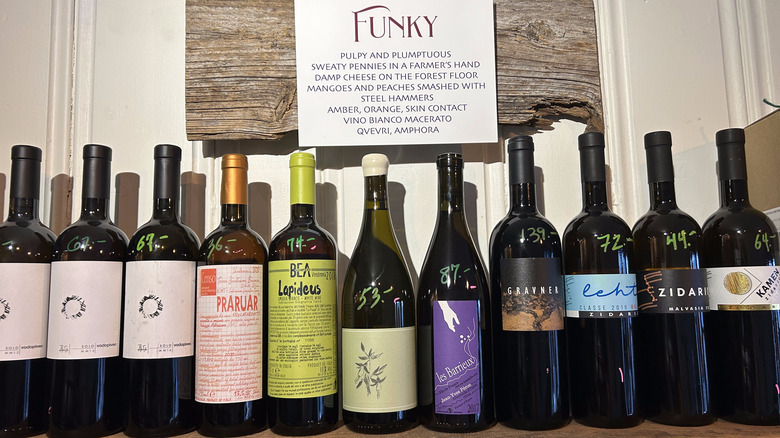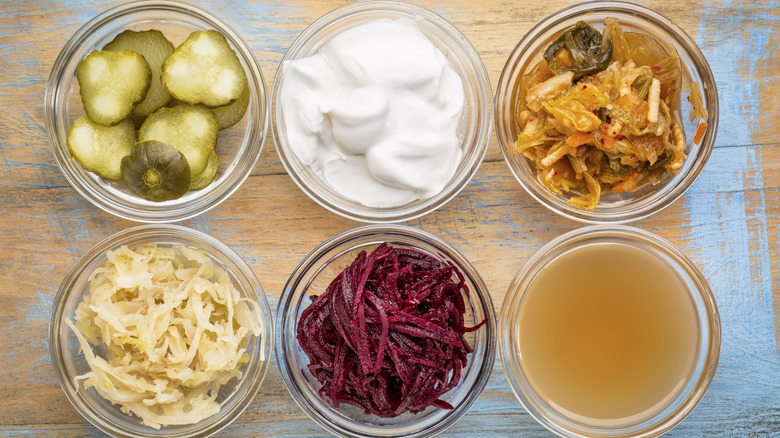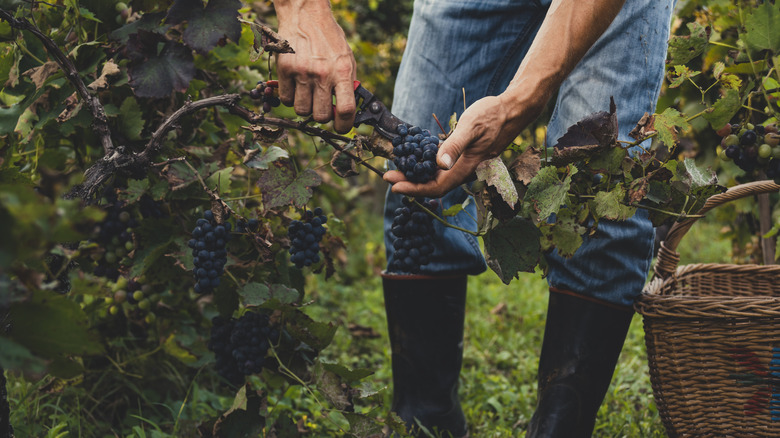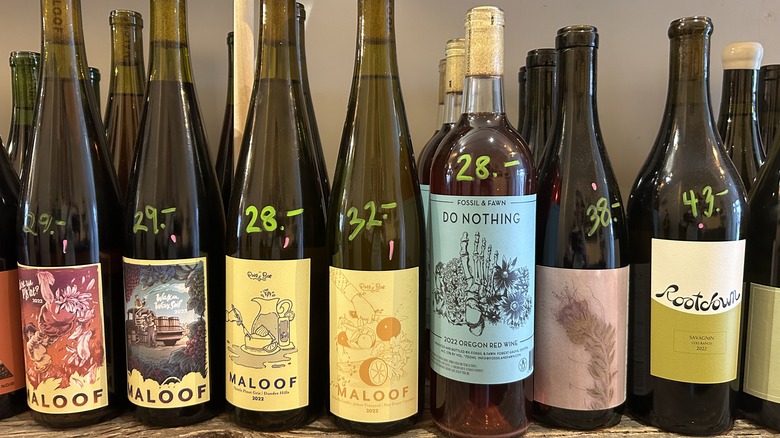Natural Wine, Explained By A Sommelier
If you've been browsing your local wine shop and noticing words like "cloudy" and "funky" being thrown around, chances are you've stumbled into the natural wine section. Natural wine has been all the rage for awhile, and many will jump to tell you of its various benefits. But "natural" is one of those words that says a lot without saying much, so it's easy to get confused, and you might find yourself wondering, "Is there really a difference between natural and conventional wine?"
In his article for The New York Times, Jesse Hirsch writes, "natural wine is at best the result of a set of well-intentioned, voluntary production principles: Use organically farmed grapes; don't add anything (like yeast) or modify anything (like acidity levels) during the fermentation process; don't filter the final product (so as to retain its funky natural flavors and microbes); and add few to no sulfites ... At worst, natural wine is a marketing buzzword, capitalizing on a hugely popular cultural trend." Natural winemakers boast that their wines are healthier and more alive, allowing you to taste the time and place a wine was made with every sip.
So, let's break it down. Chowhound spoke with level two sommelier and current general manager of Los Angeles' one Michelin star restaurant Pasta Bar, Joey Gilmore, to dig into the facts (and myths) around natural wine. We started by asking him simply, what is it?
What is natural wine?
The truth is that there's little regulation in the United States when it comes to defining the term natural. Sommelier Joey Gilmore confirms, "Natural wine can be classified by a lot of different ways. Essentially, what it means is very low intervention in the winemaking process." Due to this more "natural" process, Gilmore elaborates, "If you have 12 bottles in a case and they're all produced the exact same way in a natural style ... you'll have a lot of bottle variation and a lot of taste variation in the bottles." Unlike more commercial wines, which use commercial yeast, preservatives, and additives that help with consistency, natural wines can vary bottle to bottle. That's part of the fun for some drinkers.
Low intervention leads to wines that contain more sediment and can appear cloudy. "You can drink it," Gilmore tells us when asked if you should leave that last half glass of sediment filled wine in the bottle. "It's totally safe. Just sometimes feels like there's dirt in your mouth." As for the smell and taste of natural wine, he explains that many sommeliers use the term "mousy" to describe them. That term alludes to the fact that the wine often has "a very earthy smell to it." In more commercial operations, Gilmore says "a lot of wineries would view that as a wine flaw." This leads to terms like "funky" being thrown around when describing natural wines. But lots of drinkers are getting into the funk.
How is it made?
Joey Gilmore, sommelier, explains that when it comes to low intervention winemaking, "A lot of it has to do with native yeasts ... where, let's say, a really popular wine is made with commercial yeast ... Natural wine is made with native yeast that's like ambient just in the air." Yeast is what converts sugars into alcohol, and native yeast contributes to "varying of flavor" in natural wine. "And also, there's no added sulfites in the wines. There's no fining. There's no filtration. A lot of mass produced wines ... [they'll] use egg whites to filter out wine. And then people that are vegan don't want to drink that wine," Gilmore says. That makes natural wine appealing to many folks with particular diets. Maybe you've never asked yourself if your wine is vegan, but natural wine makers are prepared to answer that question.
Some natural winemaking dates back centuries. In fact, the label can be claimed by wineries who have been using the same processes since their founding before commercial winemaking technologies were developed. This is the case for some of the natural wines coming out of Europe, for instance. While the oldest winery in the world proudly claims to have adopted organic farming practices in 2011, for some it's less a matter of evolving eco-consciousness or being trendy, and more about preserving ancient practices. If you're interested to know more about the fermentation and methodology behind making natural wine, you can read about 13 types of natural wine here.
Is natural wine the same as organic wine?
"Natural" and "organic" are two umbrella terms that are not synonymous. Not all natural wines are organic and not all organic wines are natural, though there is a lot of overlap. When a wine has the official USDA organic label, that means that all the ingredients that went into producing that wine are certified organic. Sometimes, you'll find wines that are labeled "made with organic grapes," and those wines might have other non-organic ingredients, but the grapes themselves were certified organic. Different countries have different regulating bodies to determine organic certification, and the EU allows slightly higher levels of sulfites in their organic wines than the United States does.
When it comes to natural wines, there isn't a legal set of standards producers must adhere to. While some European nations are establishing bodies to regulate natural wine production, the term can mean different things. Natural wines are made through spontaneous fermentation using wild yeast, and without any synthetic fertilizers or additives, but the typically small growing operations may not have been officially certified organic. That certification process can be costly for small producers, so some choose to forgo it in favor of simply communicating their methods to their customers. However, they do tend to prefer organic ingredients wherever possible.
What about biodynamic wine?
"Biodynamic" is another term you'll see on some labels. Joey Gilmore, sommelier at Pasta Bar, notes this is another trend in the world of wine that appeals to conscientious consumers. The term biodynamic is also not synonymous with organic or natural, though a Venn diagram of the three terms would certainly have some overlap. Biodynamic is a term that refers to a system of sustainable agricultural practices developed by German philosopher Rudolf Steiner in the mid 1920s. That's right, the same guy who founded the Waldorf school system had some pretty intense ideas about farming too. According to W. Blake Gray at the Los Angeles Times, "It involves many Earth-friendly techniques, but at its core it's an unproven spiritual practice with planting, harvesting and bottling timed by the phases of the moon." So make of that what you will.
Biodynamic farming is regulated by an international body called the Biodynamic Federation — Demeter International. Their approach centers sustainability, ecological regeneration, and social responsibility. It's also informed by an astronomic calendar that is divided into elemental days (earth, water, air, and fire) and "fruit," "root," "leaf," or "flower" days which inform what kind of farming activities can take place. Biodynamic farming advocates the use of real animal manure instead of synthetic fertilizer, and even the practice of burying manure in cow horns, then digging them up months later to mix with water and spray on crops.
What are some types of natural wine?
You can find a natural iteration of nearly any type of wine — red, white, rosé, orange, sparkling. There are even natural champagnes. Some natural wines combine grape varietals in unexpected ways. Natural wine producers tend to be a bit more experimental. If you're looking for more specific recommendations, you can peruse this list of 12 natural wines to drink in 2024 which features vintages from across the world.
Some vineyards in Europe consider themselves natural due to their continued use of centuries old practices in wine making. Amphora wine is a skin contact orange wine that has been made using natural fermentation methods in clay amphorae in the country of Georgia for more than 6,000 years. Other countries like Italy, Spain, and Turkey make amphora. And other winemakers base their natural status in newer sustainable farming and production practices.
Pét-nats, short for "petillant natural," are sparkling natural wines that have become quite popular. Produced in a single fermentation method, different from most sparkling wines, unlike prosecco, cava, or champagne, they contain more natural sediment. Joey Gilmore, sommelier, tells us that champagne makers typically "de-gorge where they're shooting out the yeast that's in the bottle. Whereas, they don't do that with a pét-nat. So that's why you'll have sediment floating in the wine. You'll have chunks of things in your wine. Because they're not de-gorging what's called the leaves of the wine." Piquette is another lighter, lower ABV, effervescent natural wine.
Is natural wine healthier for you?
The short answer is probably not much, but maybe a little. Though many profess the benefits of natural wine, there is little science to support any marked differences to your health between drinking natural or any other wine. Nevertheless, natural wine evangelists swear that it is better for you. And maybe there's some kernel of truth to that. So, what are people saying?
One claim is that natural wines give you less headaches due to the fact that no sulfites are added into the winemaking process. While it is true that there are less sulfites in natural wine, they are still present. Pasta Bar sommelier Joey Gilmore says, "Sulfites is a byproduct of fermentation. There is no wine in the world that does not contain sulfites ... It is naturally occurring. Some wines, they will add more as it is a preservative." That means there is no wine with zero sulfites in it, but natural and organic wines will have less.
According to The New York Times, "Conventional wine is legally allowed to contain 350 parts per million of sulfites, while natural wine generally caps sulfite levels at 100 parts per million — but they typically contain much less than that." But experts explain that the sulfites present in wine probably won't be enough to trigger the average person. While some small percentage of people do have an allergic reaction to sulfites, most don't. Folks with asthma can also be more sensitive, so it can't hurt to limit your intake.
Is natural wine better for digestion?
Another health claim surrounding natural wine is that it's good for your digestion. The natural style of fermentation increases the presence of live yeast and microbes in the wine. This leads some to claim that natural wine, much like kombucha or kimchi, will contain healthy gut bacteria. However, more research is needed to verify these claims, and many experts say that the levels of alcohol present in the wine will probably kill off that bacteria before it has a chance to support your gut system.
"There wouldn't be any significant difference in microbial content whether it was so-called natural wine or not," molecular biologist and food science professor at University of California, Davis Dr. David Mills told The New York Times. "The alcohol is going to kill most beneficial bacteria anyway, so it's not like wine is ever going to have anywhere near the level of kimchi or yogurt."
So, will natural wine give you a hangover?
Yes, natural wine can definitely give you an hangover. Natural wine is still an alcoholic beverage that should be consumed in moderation. "Drink water when you drink alcohol, and you won't have a headache," advises Joey Gilmore, sommelier in Los Angeles. "It doesn't matter if it's white or red. The tannins won't give you a headache. Oak won't give you a headache ... it's the fact that alcohol sucks the moisture and hydration out of your body." And that's true of any and all forms of alcohol, regardless of how they're produced.
Some varieties of natural wine do tend to have less sugar and lower alcohol by volume as compared to many conventional wines, and that might be what led to this reputation of not making you feel as sick or giving you a hangover. There are nice bottles of natural wine that contain alcohol levels closer to that of beer or cider. Some can be as low as 4 percent ABV. That means you can sip on your wine throughout a meal or an evening and consume a much smaller total amount of alcohol by volume. And if that's the case, then it's no wonder you might think, "Hey, this wine is better for me!" after consuming a whole bottle and only getting a little tipsy. Keep in mind that is not a general rule, though. There are many natural wines with alcohol levels on par with the average or even higher.
What about environmental impact?
This is one way in which natural wine may live up to the hype. Natural, organic, and biodynamic winemaking often do have a lower environmental impact. The producers making natural wine tend to care about the health implications of their ingredients, both for the individuals consuming them and for the planet at large. They use little to no pesticides and synthetic fertilizers. They also usually choose to prioritize sustainable winemaking practices.
So overall, the ingredients in natural wine tend to come from organic, biodynamic — or at least conscientious growers — and the fact that they use less intervention, and fewer ingredients and preservatives to begin with, will likely lower their carbon footprint. If you are a conscientious consumer, you may find yourself considering them for these reasons more so than their claims to your physical health. Besides, generally speaking, they are smaller boutique wineries making these wines. So, you are supporting smaller businesses when you buy natural wines. And that's something to feel good about, whether or not you end up with a hangover.
Choosing and storing natural wine
If you love red wine, try a natural red. If you like white and you've never tried an orange wine, grab a bottle and get tasting! If you're interested in a lower ABV, try a piquette. Figuring out what wines are for you is a process of trial and error, but that process can be a lot of fun, particularly when dabbling in natural wines.
All wine should ideally be stored between 52 and 59 degrees Fahrenheit and at a humidity between 50 and 80 percent. If you don't have a wine cellar or wine fridge, find a cool dark place. Once a bottle is opened, a typical wine will last three to four days. A red wine might last five if kept properly. Store opened bottles sealed and in the fridge.
As with their more common counterparts, some natural wines are best served chilled, others room temperature. But no added sulfites means these wines contain less preservatives, and that means they tend to have a shorter shelf life. "I mean the oldest natural wine I've been able to try was probably about 10 years old," Joey Gilmore, sommelier, tells us. "I didn't enjoy it personally." Natural wines continue to ferment and change, and some also have a shorter window within which to enjoy them once opened. This is all part of the fun for natural wine enthusiasts, but it's something to keep in mind if, you know, you're not into the funkiest of the funk.

